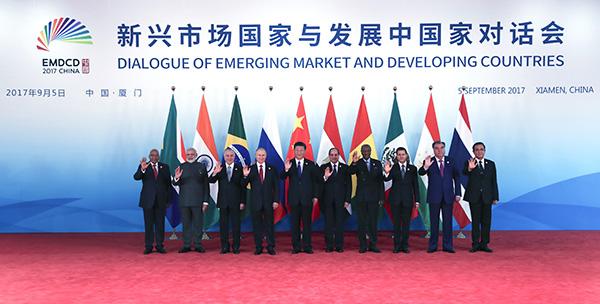新興市場國家與發展中國家對話會主席聲明
Chair’s Statement of the Dialogue of Emerging Market and
Developing Countries
2017年9月5日,廈門
Xiamen, September 5, 2017

2017年9月5日,新興市場國家與發展中國家對話會在金磚國家領導人廈門會晤期間舉行。會議由中華人民共和國主席習近平主持,金磚國家成員國巴西聯邦共和國總統特梅爾、俄羅斯聯邦總統普京、印度共和國總理莫迪、南非共和國總統祖馬,受邀的阿拉伯埃及共和國總統塞西、幾內亞共和國總統孔戴、墨西哥合眾國總統培尼亞、塔吉克斯坦共和國總統拉赫蒙、泰王國總理巴育出席會議。
On
5 September 2017, the Dialogue of Emerging Market and Developing Countries took
place on the margins of the BRICS Xiamen Summit. It was chaired by President Xi
Jinping of the People’s Republic of China and attended by President Michel
Temer of the Federative Republic of Brazil, President Vladimir Putin of the
Russian Federation, Prime Minister Narendra Modi of the Republic of India,
President Jacob Zuma of the Republic of South Africa, President Abdel Fattah
al-Sisi of the Arab Republic of Egypt, President Alpha Conde of the Republic of
Guinea, President Enrique Pena Nieto of the United Mexican States, President
Emomali Rahmon of the Republic of Tajikistan and Prime Minister Prayut
Chan-o-cha of the Kingdom of Thailand.
領導人圍繞“深化互利合作,促進共同發展”的主題,就“落實可持續發展議程”、“建設廣泛的發展伙伴關系”進行了深入交流,達成廣泛共識。主要包括:
Under
the theme “Strengthening Mutually-Beneficial Cooperation for Common
Development”, the Leaders had in-depth discussions and reached extensive
consensus on implementing the 2030
Agenda for Sustainable Development and
building broad partnerships for development, the major points of which are summarized
as follows:
領導人認為,過去幾十年,新興市場國家和發展中國家積極探索符合本國國情的發展道路,取得舉世矚目的成就。特別是近年來,這些國家發展勢頭穩定向好,已成為全球經濟增長的重要引擎,為促進各國共同發展、完善全球治理作出重要貢獻。
The
Leaders pointed out that emerging market and developing countries have actively
explored development paths suited to their respective national conditions and
made remarkable achievements over the past decades. Particularly in recent
years, these countries have maintained sound momentum of steady development,
serving as important engines of global economic growth and making important
contribution to the common development of all countries and the improvement of
global governance.
當前世界經濟經歷深刻調整轉型,新興市場國家和發展中國家面臨的機遇與挑戰并存。和平發展、合作共贏成為時代潮流,世界經濟呈現溫和復蘇勢頭。同時增長動能不足、治理滯后、發展失衡等矛盾依然突出,保護主義上升、“反全球化”思潮抬頭令人憂慮。新興市場國家和發展中國家需要加強團結合作,維護共同利益,努力營造良好外部環境。
As
the world economy is undergoing profound adjustment and transformation,
emerging market and developing countries face both opportunities and
challenges. On the one hand, peace, development and win-win cooperation remain
the trend of the times, and the world economy has shown signs of mild recovery.
On the other hand, serious challenges persist, such as weak growth drivers,
inadequate global governance and development imbalances, as well as worrying
trends of rising protectionism and growing backlash against globalization. It
is necessary for emerging market and developing countries to strengthen
solidarity and cooperation so as to safeguard their common interests and create
a favorable external environment for development.
領導人贊賞近年來金磚國家本著開放包容、合作共贏的精神,同其他新興市場國家和發展中國家開展對話合作的努力,歡迎和支持中方提出“金磚+”合作模式。這一模式為新興市場國家和發展中國家合作創造了重要機遇,有助于加強南南合作和國際發展合作,構建更加廣泛的伙伴關系網絡,推動實現公平、開放、全面、創新發展。
The
Leaders appreciated the efforts made in recent years by BRICS countries in
pursuing dialogue and cooperation with other emerging market and developing
countries in a spirit of openness, inclusiveness and win-win cooperation. They
welcomed and expressed support for the “BRICS Plus” cooperation proposed by
China, which provides important opportunities for cooperation among emerging
market and developing countries, and helps strengthen South-South cooperation
and international development cooperation and build broader partnerships for
fair, open, all-round and innovative development.
領導人強調,2030年可持續發展議程規劃了國際發展合作的新藍圖。全面落實2030年可持續發展議程,對推進世界和平與發展事業、構建人類命運共同體具有重要現實和長遠意義。國際社會應切實將政治承諾轉化為具體行動,攜手走上創新、協調、綠色、開放、共享的可持續發展之路。
Stressing
that the 2030 Agenda for
Sustainable Development offers
a new blueprint for international development cooperation, the Leaders believed
that its full implementation will be of important immediate and long-term
significance to peace and development around the world and to the pursuit of a
community of shared future for mankind. The international community needs to
translate political commitments into concrete actions in real earnest, and
jointly embark on a path toward innovative, coordinated, green, open, shared
and sustainable development.
各國應承擔起落實可持續發展議程的首要責任,將可持續發展議程同本國發展戰略有機結合,增強發展內生動力,推動經濟、社會、環境三大領域協調發展,為自身發展和國際發展合作營造良好政策環境。優先做好消除貧困、促進增長、擴大就業等工作,使發展成果惠及全體人民。發達國家應切實履行官方發展援助承諾,加大對發展中國家支持。
It
is important for all countries to shoulder their primary responsibility for the
implementation of the 2030
Agenda for Sustainable Development and
integrate it into their national development strategies, so as to boost endogenous
drivers for development and promote coordinated development in all three
dimensions – economic, social and environmental, and to create an enabling
policy environment for national development and international development
cooperation. Priorities should be given to poverty eradication, growth
promotion and job creation to ensure that everyone share in the benefits of
development. Developed countries should fully honor their Official Development
Assistance (ODA) commitments and increase support for developing
countries.
新興市場國家和發展中國家應加強包括南南合作在內的廣泛合作,加強宏觀經濟政策協調和發展戰略對接,努力促進基礎設施互聯互通、工業化、信息化、城鎮化、農業現代化等領域合作,實現聯合自強、共同發展。領導人對中國等與會方通過南南合作援助基金支持發展中國家發展表示歡迎。
Emerging
market and developing countries need to expand cooperation including
South-South cooperation, strengthen macroeconomic policy coordination,
synergize development strategies, and intensify cooperation in fields such as
infrastructure connectivity, industrialization, IT application, urbanization
and agricultural modernization, so as to achieve common development and gain
strength through solidarity. The Leaders welcomed the efforts by China and
other Dialogue participants to provide support for developing countries through
the Assistance Fund for South-South Cooperation.
氣候變化是國際社會面臨的共同挑戰。應堅持《聯合國氣候變化框架公約》原則,包括公平原則、共同但有區別的責任原則及各自能力原則,尊重各國國情,全面落實《巴黎協定》。發達國家應向發展中國家提供更多資金、技術及能力建設支持。
Climate
change is a common challenge confronting the international community. It is
important to uphold the principles of the United
Nations Framework Convention on Climate Changeincluding the principles of
equity, common but differentiated responsibilities and respective capabilities,
in the light of different national circumstances, and to fully implement the Paris Agreement. Developed
countries should provide more financial, technical and capacity building
support to developing countries.
全球經濟治理應與時俱進,堅持共商、共建、共享原則,提升新興市場國家和發展中國家的代表性和發言權。各國應致力于建設開放型經濟,維護多邊貿易體制及其基本原則,反對保護主義,共同推動世界貿易組織第11屆部長級會議取得成功,促進經濟全球化向更加開放、包容和普惠的方向發展。
Global
economic governance should keep abreast with the times and the representation
and voices of emerging market and developing countries should be enhanced under
the principles of extensive consultation, joint contribution and shared
benefits. All countries need to be committed to foster an open economy, uphold
the multilateral trading regime and its fundamental principles, oppose
protectionism, and jointly work for a successful 11th WTO ministerial
conference to make economic globalization more open, inclusive and beneficial
to all.
各國應支持聯合國在國際發展合作中發揮中心作用,對聯合國發展系統進行必要改革。改革應以促進發展為核心,以消除貧困為業務重點,堅持成員國主導,廣泛聽取和回應發展中國家關切。同時,增強聯合國協調落實可持續發展議程的效率和能力,加強系統內各機構的協調合作和優勢互補,調動更多的發展資源。
It
is important for all countries to support the United Nations in playing a
central role in international development cooperation and in conducting
necessary reform to its development system. This reform should center on
promoting development, prioritize poverty eradication, remain
membership-driven, extensively seek views of developing countries and respond
to their concerns. Meanwhile, the reform should help enhance UN’s efficiency
and capabilities in coordinating the implementation of the 2030 Agenda for Sustainable
Development, strengthen coordination and complementarity among all bodies
within the UN system and mobilize more resources for development.
領導人一致贊賞中國作為金磚國家主席國,舉辦新興市場國家與發展中國家對話會,同意繼續就落實可持續發展議程、推動國際發展合作保持溝通協調。
The
Leaders expressed appreciation to China for hosting the Dialogue of Emerging
Market and Developing Countries as the BRICS Chair and agreed to maintain
communication and coordination in implementing the 2030 Agenda for Sustainable
Development and promoting
international development cooperation.















